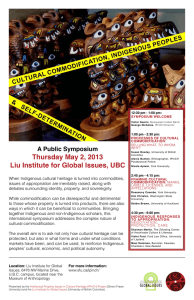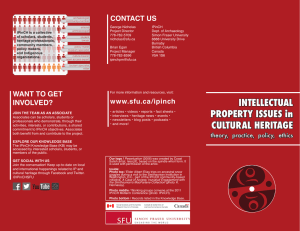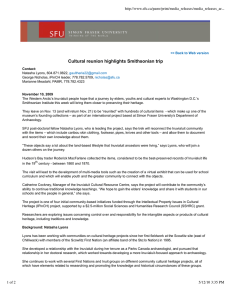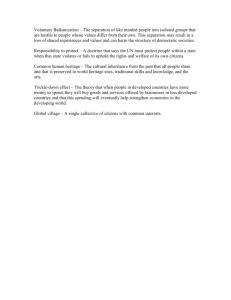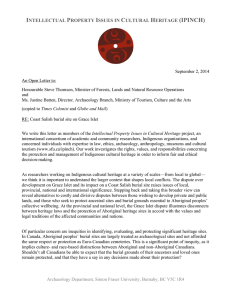INTELLECTUAL PROPERTY ISSUES in CULTURAL HERITAGE PROJECT
advertisement
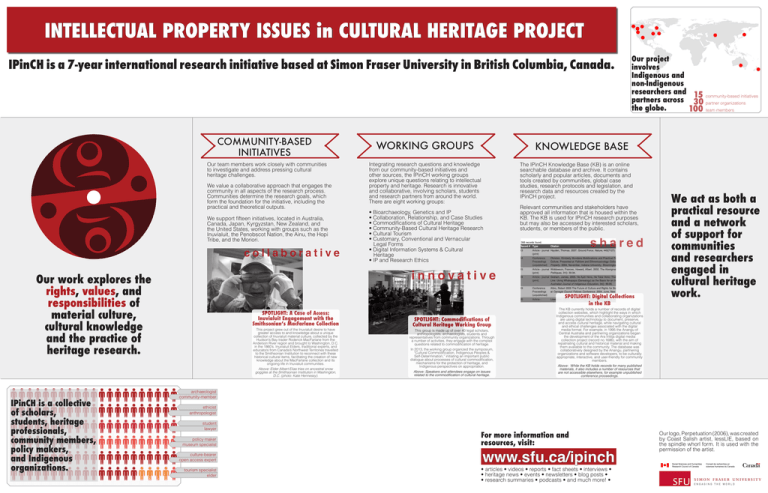
INTELLECTUAL PROPERTY ISSUES in CULTURAL HERITAGE PROJECT IPinCH is a 7-year international research initiative based at Simon Fraser University in British Columbia, Canada. COMMUNITY-BASED INITIATIVES Our team members work closely with communities to investigate and address pressing cultural heritage challenges. We value a collaborative approach that engages the community in all aspects of the research process. Communities determine the research goals, which form the foundation for the initiative, including the practical and theoretical outputs. We support fifteen initiatives, located in Australia, Canada, Japan, Kyrgyzstan, New Zealand, and the United States, working with groups such as the Inuvialuit, the Penobscot Nation, the Ainu, the Hopi Tribe, and the Moriori. collaborative KNOWLEDGE BASE Integrating research questions and knowledge from our community-based initiatives and other sources, the IPinCH working groups explore unique questions relating to intellectual property and heritage. Research is innovative and collaborative, involving scholars, students and research partners from around the world. There are eight working groups: The IPinCH Knowledge Base (KB) is an online searchable database and archive. It contains scholarly and popular articles, documents and tools created by communities, global case studies, research protocols and legislation, and research data and resources created by the IPinCH project. • Bioarchaeology, Genetics and IP • Collaboration, Relationship, and Case Studies • Commodifications of Cultural Heritage • Community-Based Cultural Heritage Research • Cultural Tourism • Customary, Conventional and Vernacular Legal Forms • Digital Information Systems & Cultural Heritage • IP and Research Ethics Relevant communities and stakeholders have approved all information that is housed within the KB. The KB is used for IPinCH research purposes but may also be accessed by interested scholars, students, or members of the public. shared innovative Our work explores the rights, values, and responsibilities of material culture, cultural knowledge and the practice of heritage research. IPinCH is a collective of scholars, students, heritage professionals, community members, policy makers, and Indigenous organizations. WORKING GROUPS Our project involves Indigenous and non-Indigenous researchers and 15 community-based initiatives partners across 30 partner organizations the globe. 100 team members SPOTLIGHT: Digital Collections in the KB SPOTLIGHT: A Case of Access: Inuvialuit Engagement with the Smithsonian’s MacFarlane Collection This project grew out of the Inuvialuit desire to have greater access to and knowledge about a unique collection of Inuvialuit material culture, collected by the Hudson’s Bay trader Roderick MacFarlane from the Anderson River region and brought to Washington, D.C. in the 1860’s. Inuvialuit Elders, traditional experts, and educators from Canada’s Northwest Territories travelled to the Smithsonian Institution to reconnect with these historical cultural items, facilitating the creation of new knowledge about the MacFarlane collection and its ongoing life in Inuvialuit communities. Above: Elder Albert Elias tries on ancestral snow goggles at the Smithsonian Institution in Washington, D.C. (photo: Kate Hennessy). SPOTLIGHT: Commodifications of Cultural Heritage Working Group This group is made up of over 40 legal scholars, anthropologists, archaeologists, students and representatives from community organizations. Through a number of activities, they engage with the complex questions related to commodification of heritage. In 2013, the working group organized the symposium, “Cultural Commodification, Indigenous Peoples & Self-Determination,” initiating an important public dialogue about processes of cultural commodification, mechanisms for the protection of heritage, and Indigenous perspectives on appropriation. Above: Speakers and attendees engage on issues related to the commodification of cultural heritage. We act as both a practical resource and a network of support for communities and researchers engaged in cultural heritage work. The KB currently holds a number of records of digital collection websites, which highlight the ways in which Indigenous communities and collaborating organizations are using digital technology to document, preserve, and access cultural heritage, while navigating cultural and ethical challenges associated with the digital media format. For example, in 1995 the Anangu of Central Australia and partnering organizations began the development of the Ara Irititja digital media collection project (record no.1686), with the aim of repatriating cultural and historical material and making them available to the community. The database was collaboratively designed by the Anangu, partnering organizations and software developers, to be culturally appropriate, interactive, and user-friendly for community members. Above: While the KB holds records for many published materials, it also includes a number of resources that are not accessible elsewhere, for example unpublished conference proceedings. archaeologist community-member ethicist anthropologist student lawyer policy maker museum specialist culture-bearer open access expert tourism specialist elder For more information and resources, visit: www.sfu.ca/ipinch • articles • videos • reports • fact sheets • interviews • • heritage news • events • newsletters • blog posts • • research summaries • podcasts • and much more! • Our logo, Perpetuation (2006), was created by Coast Salish artist, lessLIE, based on the spindle whorl form. It is used with the permission of the artist.
